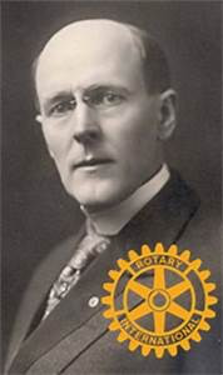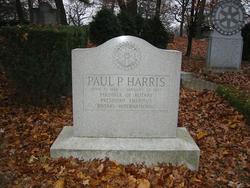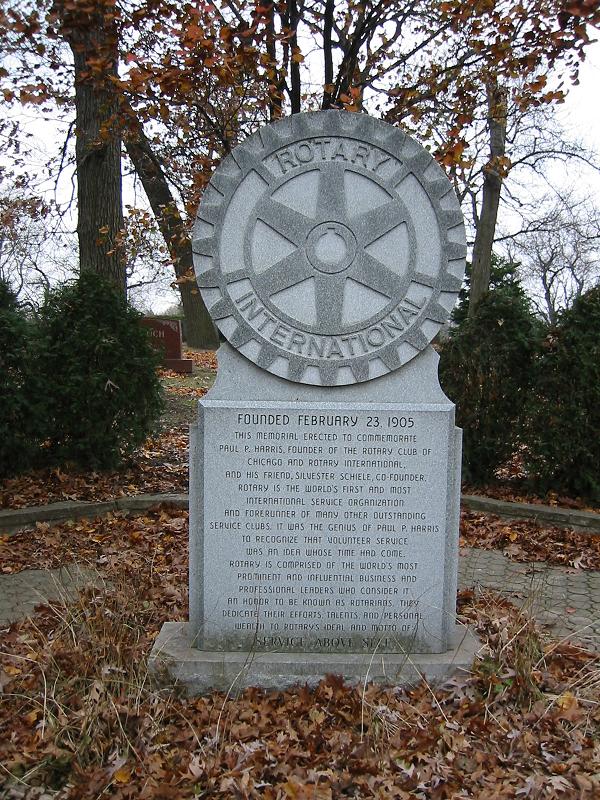 “The truth is he rode no white charger. He carried no flaming sword. He was rather a very average young man much too busy to take on outside obligations, much too harassed by the demands of earning a living. They say he was good-hearted but prone to procrastination. However, he had one saving grace - he recognized his shortcomings.” Oren Arnold - The Golden Strand, An Informal History of the Rotary Club of Chicago, speaking of Paul Harris.
“The truth is he rode no white charger. He carried no flaming sword. He was rather a very average young man much too busy to take on outside obligations, much too harassed by the demands of earning a living. They say he was good-hearted but prone to procrastination. However, he had one saving grace - he recognized his shortcomings.” Oren Arnold - The Golden Strand, An Informal History of the Rotary Club of Chicago, speaking of Paul Harris.During April, the Rotary world honors Paul Harris’s birthday. Although Paul never had an official birth certificate authenticating his arrival on April 19th, 1868 to a struggling family in the small town of Racine Wisconsin, the above description reflect the character of the man he grew to be.
As Paul Harris grew up in the post-Civil War period, few people gave him much of a chance that he would amount to much. He was, after all, the product of dysfunctional family who had committed the unforgivable sin of filing for bankruptcy and living off the generous charity of his grandparents.
As a teenager, he spent much of his time roaming the streets of Wallingford, Vermont getting into trouble and keeping the quiet town in a constant state of disarray. He was expelled from three different schools and because of his reputation, was often prejudged as not being suitable when applying for a job.
When he finally graduated from a then obscure college in Iowa, he wandered the world by himself for almost five years before settling in Chicago, perhaps one of the roughest and toughest cities in the country.
 Today, this often wayward and unruly rebel is remembered as the founder of one of the world’s greatest humanitarian and service- oriented organizations, Rotary.
Today, this often wayward and unruly rebel is remembered as the founder of one of the world’s greatest humanitarian and service- oriented organizations, Rotary.Somehow, this humble man has been elevated to lofty heights and given extraordinary powers of perception for what he supposedly had accomplished. Yet, ironically, Paul Harris would be the first to say his role was very mi nor. He rarely took credit for Rotary, leaving the high honors and praise for others to bask in.
Paul’s ideas about Rotary were simple. All he ever wanted was for Ro tarians to have fun. They should delight in being with each other and be tolerant of their differences. They should try to look for the best in people and try to cap- ture the joy and beauty of life. He asked that Rotarians think of others before themselves and to live by the Golden Rule in their business and personal lives. If they could do this, then Rotary will have provided everything they could envision.
In later life, Harris reduced his involvement in both the Rotary Club and his legal practice, but continued to write. He often spent his winters in Alabama. In early 1946, while vacationing with his wife in Alabama, Harris grew ill. He returned to Beverly, Illinois, but never fully recovered. He died on January 27, 1947 at the age of 78 and was interred at Mount Hope Cemetery in Chicago's Morgan Park neighborhood. Hisautobiography, "My Road to Rotary" was published the following year.
One final note; the accepted date of Paul Harris’s birth is April 19, 1868, yet there was an apparent misprint on his funeral program listing his birthdate as April 19, 1869 instead of 1868. Although Paul had no official birth certificate, years before, his good friend Silvester Schiele attested in legal documents that Paul’s actual date of birth was 1868. As a courtesy, since Silvester didn’t have a birth certificate either, Paul legally attested to his friend’s date of birth. Today, both men are buried next to each other at Mount Hope Cemetery in Chicago


Above from an article, History Matters-Paul Harris Birthday, by PDG Fred Carvin, author of “Paul Harris and the Birth of Rotary” unpublished copy- right © Fred A. Carvin, 2014.